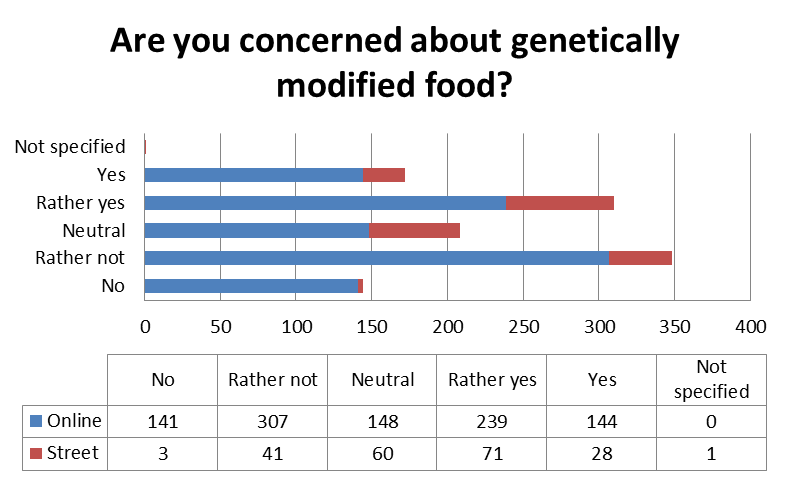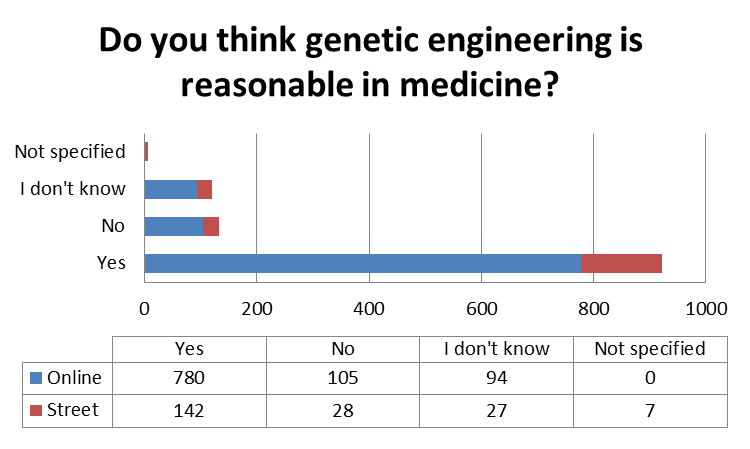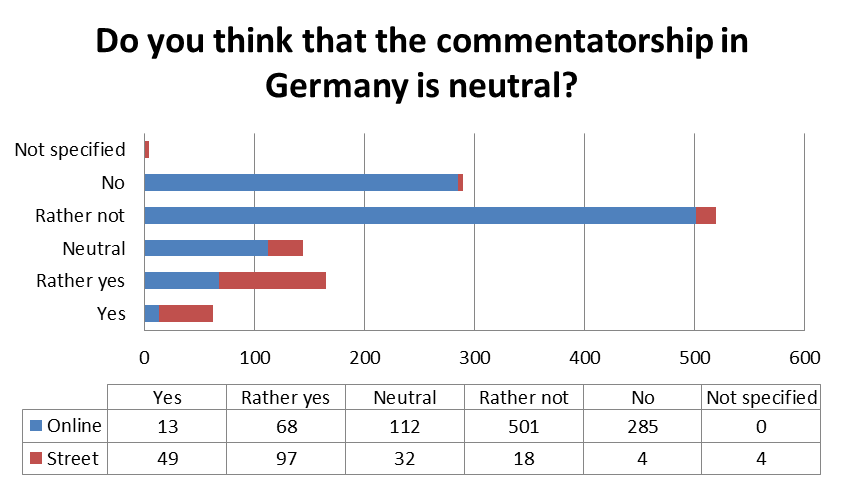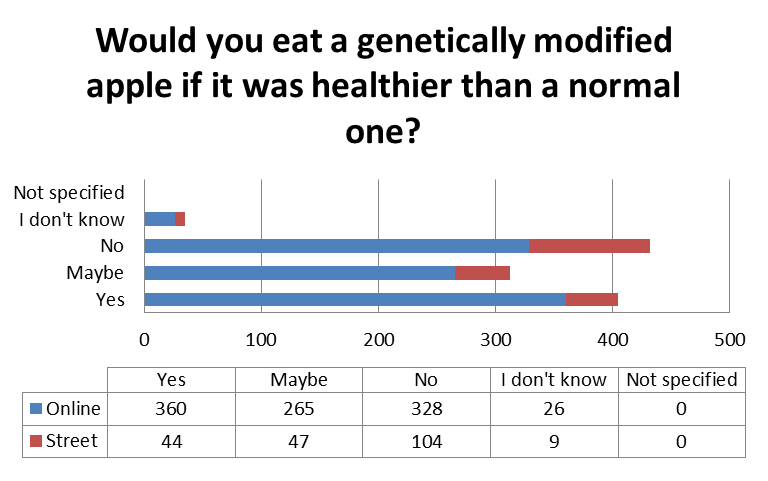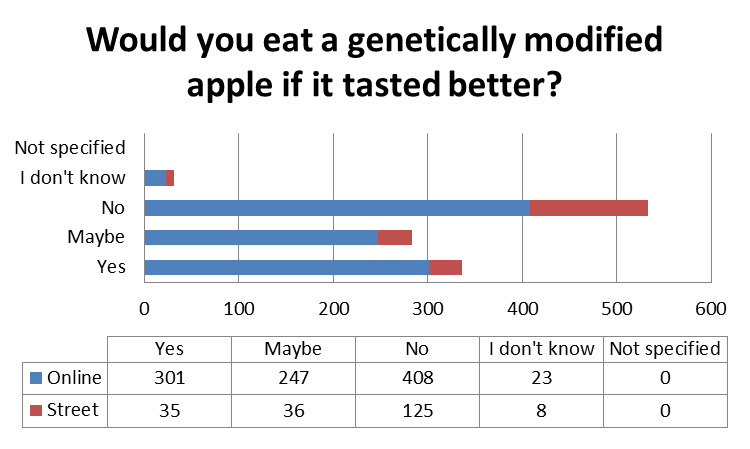Team:TU Munich/Human Practice/Survey
From 2012.igem.org
(→Conclusion) |
(→Answers) |
||
| (11 intermediate revisions not shown) | |||
| Line 4: | Line 4: | ||
<hr/> | <hr/> | ||
===Background=== | ===Background=== | ||
| - | The survey was carried out by the [http://portal.mytum.de/jungeakademie/index_html/document_view?/ TUM young academy], which planned to install a [http://www.genial-info.de/ website] to inform the public about genetic engineering. They made an '''online questionnaire''' and | + | The survey was carried out by the [http://portal.mytum.de/jungeakademie/index_html/document_view?/ TUM young academy], which planned to install a [http://www.genial-info.de/ website] to inform the public about genetic engineering. They made an '''online questionnaire''' and informed munich people with a print out version of the project. |
| - | + | As a whole '''1183''' people participated (979 people online and 204 people on the street) from which were 597 male people and 570 female people. It needs to consider, that the group of the 15 till 24 aged is drastically over represented (70% of all participants). | |
<br/> | <br/> | ||
| - | This team allowed us to use their data for our project as well. As they had 33 questions, we chose the ones directly relied to genetic engineering | + | This team allowed us to use their data for our project as well. As they had 33 questions, we chose only the ones directly relied to genetic engineering. |
| - | ===Basic | + | ===Basic Data=== |
*Participants: 1183 | *Participants: 1183 | ||
*Online participants: 979 | *Online participants: 979 | ||
| Line 30: | Line 30: | ||
====Answers==== | ====Answers==== | ||
| - | [[File:TUM12_Overall.png|thumb|left|400px|Overall impression about genetic engineering]] | + | <br/> |
| - | [[File:TUM12_Knowledge.png|thumb|right|400px|Knowledge about genetic engineering]] | + | [[File:TUM12_Overall.png|thumb|left|400px|'''Fig. 1: Overall impression about genetic engineering.''']] |
| - | [[File:TUM12_Concerns about food.png|thumb|left|400px|Concerns about genetically modified food]] | + | [[File:TUM12_Knowledge.png|thumb|right|400px|'''Fig. 2: Knowledge about genetic engineering.''']] |
| - | [[File:TUM12_Genetic engineering in farming.png|thumb|right|400px|Acceptance of genetic engineering in farming]] | + | [[File:TUM12_Concerns about food.png|thumb|left|400px|'''Fig. 3: Concerns about genetically modified food.''']] |
| - | [[File:TUM12_Genetic engineering in medicine.png|thumb|left|400px|Acceptance of genetic engineering in medicine]] | + | [[File:TUM12_Genetic engineering in farming.png|thumb|right|400px|'''Fig. 4: Acceptance of genetic engineering in farming.''']] |
| - | [[File:TUM12_Media.png|thumb|right|400px|Neutrality of the German media from the point of view of the public]] | + | [[File:TUM12_Genetic engineering in medicine.png|thumb|left|400px|'''Fig. 5: Acceptance of genetic engineering in medicine.''']] |
| - | [[File:TUM12_Healthier apple.png|thumb|left|400px|Decision to eat an genetically modified apple if it was healthier]] | + | [[File:TUM12_Media.png|thumb|right|400px|'''Fig. 6: Neutrality of the German media from the point of view of the public.''']] |
| - | [[File:TUM12_Tastier apple.png|thumb|right|400px|Decision to eat an genetically modified apple if it was tastier]] | + | [[File:TUM12_Healthier apple.png|thumb|left|400px|'''Fig. 7: Decision to eat an genetically modified apple if it was healthier.''']] |
| + | [[File:TUM12_Tastier apple.png|thumb|right|400px|'''Fig. 8: Decision to eat an genetically modified apple if it was tastier.''']] | ||
<br/><br/><br/><br/><br/><br/><br/><br/><br/><br/> | <br/><br/><br/><br/><br/><br/><br/><br/><br/><br/> | ||
==Conclusion== | ==Conclusion== | ||
In contrary to our first impression, about half of the questioned people said that they have a "normal" or better amount of knowledge. In our former human practice events we often realized that the discussions are rather emotional than scientific. This difference could arise from the mostly younger people who participated. Because in Germany genetic engineering started to play a bigger role in schools and in the media, although as mentioned below, the media is not always neutral. | In contrary to our first impression, about half of the questioned people said that they have a "normal" or better amount of knowledge. In our former human practice events we often realized that the discussions are rather emotional than scientific. This difference could arise from the mostly younger people who participated. Because in Germany genetic engineering started to play a bigger role in schools and in the media, although as mentioned below, the media is not always neutral. | ||
| - | The overall impression of genetically modified organisms is not that bad, but it needs to be differentiated where genetic engineering is used. | + | The overall impression of genetically modified organisms is not that bad, but it needs to be differentiated where genetic engineering is used. Most people agree that it is appropriate to use it in medicine. |
<br/> | <br/> | ||
| - | In contrast 633 people (food) and 573 people (farming) did not accept genetic engineering in food and agriculture. As already mentioned on our [https://2012.igem.org/Team:TU_Munich/Human_Practice/Overview overview page] people do not accept GMOs in their food. | + | In contrast 633 people (food) and 573 people (farming) of 1183 participants did not accept genetic engineering in food and agriculture. As already mentioned on our [https://2012.igem.org/Team:TU_Munich/Human_Practice/Overview overview page] people do not accept GMOs in their food. In Germany great skepticism persists. |
| - | + | The fact that people (533) would not eat genetically modified apples even if they would taste similar, shows the low acceptance as well. If genetic engineering would be used for production of healthier aliment, the renunciation decreases. | |
<br/><br/> | <br/><br/> | ||
| - | + | The advantages of green biotechnology are not present in people's minds and many people think that they are not informed impartial. This leads to a negative point of view and therefore neutral reporting is essential. | |
| - | All in all | + | |
| + | All in all red biotechnology is widely accepted in Germany whereas green biotechnology is discussed controversial. Additionally some Germans think that media does not report objective about GMOs. Furthermore people wish that genetic engineering plays a bigger role in politics. | ||
Latest revision as of 21:08, 26 October 2012



Contents |
Survey
Background
The survey was carried out by the [http://portal.mytum.de/jungeakademie/index_html/document_view?/ TUM young academy], which planned to install a [http://www.genial-info.de/ website] to inform the public about genetic engineering. They made an online questionnaire and informed munich people with a print out version of the project.
As a whole 1183 people participated (979 people online and 204 people on the street) from which were 597 male people and 570 female people. It needs to consider, that the group of the 15 till 24 aged is drastically over represented (70% of all participants).
This team allowed us to use their data for our project as well. As they had 33 questions, we chose only the ones directly relied to genetic engineering.
Basic Data
- Participants: 1183
- Online participants: 979
- Street participants: 204
- Male: 597
- Female: 570
- Age: mainly between 15-24 (70%)
Questions
Evaluated questions
- How do you feel about genetic engineering in general?
- How good do you think is your knowledge about genetic engineering?
- Are you concerned about genetically modified food?
- Do you think genetic engineering is reasonable in medicine?
- Do you think genetic engineering is reasonable in farming?
- Do you think genetic engineering is reasonable in food?
- Do you think the commentatorship in Germany is neutral?
- Would you eat a genetically modified apple if it was healthier?
- Would you eat a genetically modified apple if it tasted better?
Answers
Conclusion
In contrary to our first impression, about half of the questioned people said that they have a "normal" or better amount of knowledge. In our former human practice events we often realized that the discussions are rather emotional than scientific. This difference could arise from the mostly younger people who participated. Because in Germany genetic engineering started to play a bigger role in schools and in the media, although as mentioned below, the media is not always neutral.
The overall impression of genetically modified organisms is not that bad, but it needs to be differentiated where genetic engineering is used. Most people agree that it is appropriate to use it in medicine.
In contrast 633 people (food) and 573 people (farming) of 1183 participants did not accept genetic engineering in food and agriculture. As already mentioned on our overview page people do not accept GMOs in their food. In Germany great skepticism persists.
The fact that people (533) would not eat genetically modified apples even if they would taste similar, shows the low acceptance as well. If genetic engineering would be used for production of healthier aliment, the renunciation decreases.
The advantages of green biotechnology are not present in people's minds and many people think that they are not informed impartial. This leads to a negative point of view and therefore neutral reporting is essential.
All in all red biotechnology is widely accepted in Germany whereas green biotechnology is discussed controversial. Additionally some Germans think that media does not report objective about GMOs. Furthermore people wish that genetic engineering plays a bigger role in politics.
 "
"


